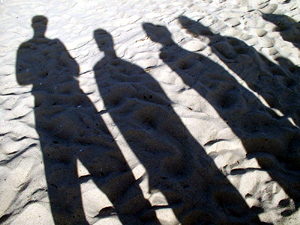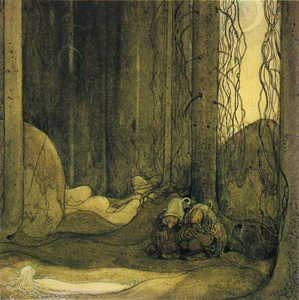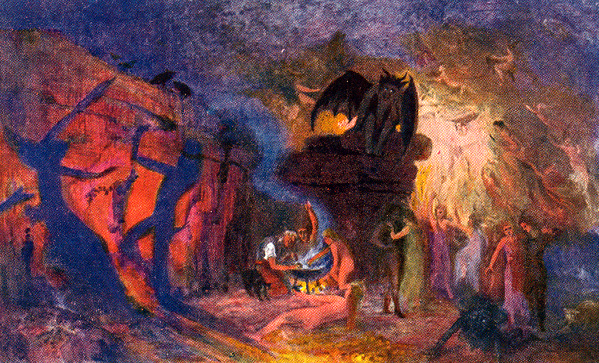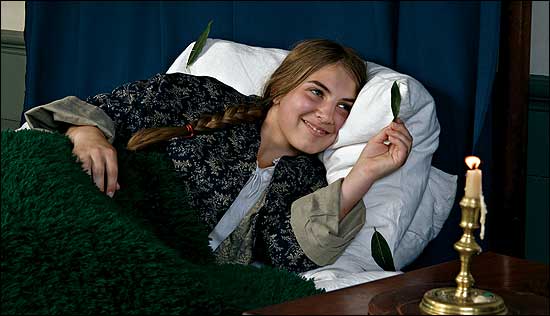Culture and Society: Superstitions and Folklore
General
Three major factors contribute to superstitions in Germany. One is religion; most beliefs deal with the Holy Family (Jesus, Mary, and Joseph) and other notable teachings in Roman Catholicism, one of the dominant religions in Germany since the Holy Roman Empire between the 17th and 18th centuries. Another factor is a string of legends passed down through oral tradition. The third is a mix of inhabitants, composed of Greek, Turkish, Polish, and Italian, with varying superstitions whose influence still impacts Germans today.
The German Skeptics Society, a group formed in the early 1990s, was established for the sole purpose of considering superstitions. They view astronomy, astrology, and religion as good examples of superstitions. Their events are well attended, not only by the locals but by the superstitious from other parts of the world.
Specific Superstitions
Doppelgänger
Doppelgänger is the vernacular term for "double-walker" or "alter-ego." It describes a clone-like shadow, which only appears to the person it physically imitates. It is also regarded as a ghost because it becomes non-existent when viewed in the mirror.
The origin, as stated in various research studies around the world, is the cave allegory written by Plato, the famous Greek philosopher. This fable illustrates that the untaught form assumptions without going through the process of using equations to solve problems. The Cave is a story of prisoners in a cave who have their backs against a wall. Behind them, puppeteers used a bonfire as a source of light to make hand signs that formed shadows for the prisoners to see. The prisoners thought, and insisted that, what was in front of them was real because they were tied in a steeped area and they could not look back. They just relied upon the shadows and the sounds they heard.
Shadows became a sign of danger. When a person saw his doppelganger, he either died a natural death or committed suicide. An ancient superstition held that a person would be able to find out if he would die if he stood vigil near the church door on April 24 during St. Mark’s feast day. Allegedly on this eve at midnight, ghost-like doppelgangers of all who will purportedly die file into the parish; if an observer spots his double in the procession, death is imminent. The shadow clones could also be naughty and often tricked their victims’ families and friends with their appearance. But some also acted as a good conscience to their human counterparts by instilling positive thoughts and giving pieces of advice.
This character has remained popular among Germans. The word Doppelganger likewise gave rise to a well-known term, "dead ringer," which is its loose translation in English. Figuratively speaking, it rings someone’s consciousness that he will die soon if he sees his supernatural "twin" face to face. Deaths of renowned public figures have been documented with the doppelganger as the indirect catalyst. Some whose deaths have been linked in this way include English poet Percy Bysshe Shelley, German poet Goethe, and even Britain’s Queen Elizabeth I. In Hollywood pop culture, a number of movies and other forms of art have been dedicated to it, such as the 1993 Doppelganger movie that starred Drew Barrymore.
The Doppelganger notion was also linked to people covering mirrors in the home of the deceased to prevent the departed from carrying the double of anyone’s image into the afterworld.
Note: A Wiedergänger is a spirit that returns to the world of the living after death. This spirit usually has evil intent toward the living, either because of unjust suffering (i.e., disturbance of their deadly peace), or because their soul was not released due to loose moral conduct while living.
Candlemas
The Germans commemorate the Candlemas (Maria Licht Messe) celebration in church every year on February 2nd. This is a Christian holiday celebrated as a tribute to the Biblical event as narrated in the Gospel of Luke 2:22–40, in which St. Joseph and the Virgin Mary presented their son Jesus to God in the Temple.
The celebration, filled with songs and praises, starts with the priest blessing the candles by reciting orations and sprinkling incense on them to be given to the clergy and lay ministers afterward. A procession follows at which the participants light the candles and bring them along, signifying the entrance of Jesus into the Temple. When the procession ends, the priest, holding a statue of the Child Jesus, enters the church and approaches the altar with his clergy. The procession ends with everyone singing a hymn honoring the Virgin Mary.
The Candlemas festival was originally established in Jerusalem, on the 40th day following the birth anniversary of Jesus. The tradition then spread amongst the people of Rome, Germany, and the United States. It has been celebrated from the 5th century to date.
Candlemas served as the breeding ground for the superstition of the badger, a big feline-like animal, which the Germans passed on to the Americans in the 17th century when the Pennsylvania Dutch arrived in the country. Because badgers are not found in some U.S. states, the Americans replaced them with the groundhogs, or woodchucks. The fanciful celebration of "Groundhog Day" emanates from this century-old tradition. As the story goes, if the emerging groundhog has a shadow when it comes out of its hole every Candlemas, the winter will continue and the groundhog will return to its den for six more weeks of hibernation. Without the presence of the shadow, spring will commence sooner and the groundhog will emerge to go about its outdoor activities..
For as the sun shines on Candlemas Day,
So far will the snow swirl until May.
For as the snow blows on Candlemas Day,
So far will the sun shine before May.
The Changeling
Supernatural creatures such as dwarfs are often blamed as the ones responsible for stealing babies and replacing them with their own kind, in order for their race to continue or to simply annoy humans.
Different versions of the changeling (Wechselbalg) superstition can be traced to a number of cities in Germany. The origin of the superstition holds that a married couple worried about their baby’s enlarged head and underdevelopment in growth and speech. They sought professional help and learned that dwarves had swapped their child for a changeling. To prove it they were told to put beer and yeast on an empty eggshell, mix it together until it became foamy and spilled over. If the child started speaking, it meant the changeling was with them. The parents did the mixing in front of the child as required, and the child in turn said, "Ik bün so olt, as Böhmer Gold, doch dat seih ik taum irsten Mal, dat man Bier brugt in Eierschal” (Now I am as old as a Bohemian gold, but this is the first I've ever heard of beer being brewed in an eggshell). As a result, they threw the changeling into the river, and, the day after, they found their real child in the cradle.
Germans superstitions held many ways to prevent this from happening: such as, putting a key, a page from the Holy Bible, or a pair of pants owned by the father as an amulet near the infant and cradle immediately after baptism; always keeping mother and child company especially six weeks after childbirth; and exposing the child to sunlight because supernatural beings fear light.
The Legend of Lorelei (Loreley)
The Rhine river in central Germany brings thousands each year to take in the scenic beauty of the area. As river boats cruise up and down the channel, those that pass a rock in the upper middle Rhine Valley on the eastern bank near Sankt Goarshausen in Rheinland-Pfalz will likely hear the legend of the mystical Loreley, said still to live on the 132-meter rock. Dotted with castle ruins and vineyards, the area has always attracted artists and writers. Already in the 13th century, people believed that the fabulous mythical treasure of the Nibelungen (based on the medieval Nibelungen Lied), said to bring an inexhaustible source of power to its holder, was buried here.
In 1801, Clemens von Brentano, penned the Lore Ley ballad, inspired by a river journey on the Rhine. The heroine of his story was a beautiful sorceress who could lure any man who looked upon her to fall in love with her. Refusing to condemn her, the bishop summoned to judge her also fell in love with her and sent her to an abbey to be a nun. Along the way, Lore Lay asked her escorts if she might climb a steep rock that they had passed for a last view of the Rhine and her lover’s castle. Upon climbing the rock she saw an approaching ship and declared that her lover was aboard, then hurled herself to her death. Some say that it was due to despair over a faithless lover that drove her over the rocks. Legend has it that she was transformed into an evil siren that lured sailors to their demise with her enchanting and hypnotic singing.
Thereafter, others used her as a figure in their stories, where she appeared as a fairy, a witch, or a mermaid who sat on a rock and lured sailors to their death. Perhaps the most famous incarnation of Loreley comes from Heinrich Heine’s poem written in 1823, where he describes her as a virgin with long, golden hair, who sang a haunting melody while combing her hair. At one time, an echo could be heard on the southern slope of the rock, propelling the myth that Loreley was singing or scornfully laughing.
Although most now hear the story as legend and folklore, the site of the famous rock has long been known for its treacherous rapids and the rocks that lie just beneath the surface, which left sailors dead or shipwrecked. Despite safety precautions put in place, a Rhine cruise boat unfortunately named "Loreley" ran into the cliff with 349 passengers aboard, injuring 40, and then running aground.
Other Superstitions
Actions
- Immediately burn hair strands that have fallen out due to combing before a bird takes the strands to the nest. Failure to do so causes the owner of these strands to go blind with cataracts or to have a headache.
- Clothing sewn using thread or yarn spun the day before Christmas acts as insect and pest repellent.
- Those who spin thread every Saturday evening will end up as restless souls when they pass away.
- Take a cold bath on the start of Easter for a year of good health.
- Working in the woods hinders you from being financially wealthy.
- Itching on your right hand means spending money, while itching on your left hand means acceptance of money.
- Prior to retiring to bed for the evening, shoes should be placed on the floor facing the door. The owner of the shoe should walk backwards to prevent nightmares.
- Always empty a glass when drinking liquids to avoid having a devilish mother-in-law.
- When giving scissors or knives as gifts, always give a penny as well so the former don’t cut into your luck.
Animals
- Black dogs are guardians against evil. Black dogs appear often in ghost stories or in the legends of Wotan, the main Germanic god. Faust also first meets Mephistopheles while he is disguised as a black poodle.
- Bats, known in German as the Fledermaus, have always had mythical stories built around them. For example, bullets moistened with a bat’s heart would lead to targeted gunshots. Keeping powdered bat hearts handy prevented one from being shot or bleeding profusely from gun shots.
- In Bavarian regions (and in Scandinavia) On December 24-25, during the hour between 12 a.m. and 1 a.m., animals were said to talk. They would often get an extra feeding or snack on that night.
- If you hear an owl shrieking at night, someone will die. Owls were once also known as Totenrufer (death criers).
Bad luck
- Harming or killing cats and spiders
- A man seeing an old woman, a virgin woman, and a priest
- Walking between two old women first thing in the morning
- Hens that sound like roosters
- Sewing clothes while they are on a body
- Seeing spiders in the morning
- Putting the left foot on the floor first when getting out of bed
- Number 13
- Meeting a black cat along the way
- Glass that breaks/falls on its own
- Breaking a mirror
- Thirteen place settings at a dinner; even if there are 13 guests, a 14th place setting should be set
- Seeing a black cat cross in front of you from left to right
Body parts
- Scratching a woman’s head is a sign that she shall suffer from beatings.
Dates/Holidays
- On Palm Sunday, the Sunday before Easter, small bundles of flowers would be brought to the church for blessing. Those who hang it at home would protect their animals and keep lightning from striking the house.
- If girls draw water at Easter from special wells, they’ll be guaranteed beauty.
- The last six days of the old year and the first six days of the new year following Christmas have long been known as Raunächte or Heiligen Nächte (holy nights). A literal translation means "rough, raw, or harsh nights." In ancient legend, Wotan, the supreme Germanic god, would go on hunt during this time with his black and grey dogs and his hunting attendants, making the time frame dangerous for regular folk to be outside. Folk beliefs also held that evil ghosts would be roaming during this stormy season, looking to harm houses, stalls, and farms. Locals would dress in furs and masks and make loud noises to scare away the spirits. The working class would not work during these days. Many legends are attached to this time period; for example, dreams on each of those days portend what will happen on the corresponding month of the coming year.
Death and funerals
- Certain tasks must be followed in order for a sick person to die peacefully and for the deceased person’s soul to leave earth easily without wandering. These tasks include opening windows, removing vinegar from any corner or shelf, filling whatever object is empty inside the house, and turning those objects around with their openings unblocked.
- The garments of a deceased person should be washed immediately after his death so he can rest in peace.
- A person won’t have a hard time dying when he is left lying down in the corridor or if three tiles are lifted from the roof of the house.
- Transferring a stalk of parsley to new soil causes death.
Good luck
- Upon hearing the first call of the cuckoo during the year, if you clap your wallet one to three times with your hand, it means you’ll have money the rest of the year.
- Knocking three times on wood
- Pressing thumbs (German version of "keeping fingers crossed")
- A penny in your pocket
- Birthstones
- A four-leaf clover
- An encounter with a Schornsteinfeger or Schlotfeger (commonly called "chimney sweep") during the New Year. This is usually pictured as a blonde-haired little boy giving away talismans such as the four-leaf clover and the red and white Amanita muscaria (lucky mushrooms).
- Hanging horseshoes inside the house
Mythical Characters/Symbols/Beliefs
- The hour between 12 a.m. and 1 a.m. is said to be Geistestunde (meaning ghost hour).
- Rainwater on tombstones lightens and fades freckles.
- If rain falls while the sun shines, it is referred to as poison rain.
- A stork’s nest on rooftops and chimneys signifies long life and prosperity.
- An ox-driven cart should be the only transport for the last grape harvested of the season. If other transportation is used, grapes will be sour and when used for wine, it will not be tasty.
- Treasures can be found at the end of the rainbow.
- The Alpdruck or Alptraum is an evil spirit that causes Alpdrücke (nightmares). While you are asleep, it silently strikes you by putting its weight on your feet, moving up to the stomach, then to the chest, causing you to have difficulty breathing. To stop it from disturbing sleep: leave your shoes in front of the door; climb onto the bed backwards; turn on the light; avoid hiding in a pine tree’s curly twig (raindrops that go through the twig and fall on your head cause nightmares); close windows and doors; cross arms and legs before sleeping; and hide a steel-made item under the bed. You can also urinate in a clean unused bottle and hang it under sunlight for three days, carry it without talking, and throw it over your head into the running stream.
- The Hertha Lake, a mysterious body of water featured in legends, is home to a female spirit who consumes anything or anyone who swims in it.
- The Holler (Elderberry) tree is believed to have healing powers. The blossom of the tree has medicinal properties with very high Vitamin C content and minerals, with its juice used for medicinal purposes. In times past, Germans buried clothes and baby teeth under it as protection against negative forces and sickness and used the tree’s wood as an amulet. This process was believed to transfer the sickness from the intended person to the tree itself. If you attempt to put ornaments on the tree, it allows the presence of the changeling.
Nature
- The willow tree is considered unlucky because that is where Judas Iscariot, one of Jesus’ apostles who later became a traitor, committed suicide by hanging. Its branches are also believed to transform into snakes, an animal symbol for betrayal illustrated in the Holy Bible since the time of Adam and Eve.
- If it rains on June 27, then it will rain for seven weeks; if it does not rain on June 27, you’ll have seven weeks of good weather.
- The Brocken, the highest peak in Germany's Harz Mountains and northern Germany, has long played a role in witch tales and other legends. Legends say that the witches convene and dance on the mountain on April 30, Walpurgisnacht. German author Goethe refers to the mountain as a center for witch revelry as well in his tale of Faust. Mists and fog shrouding the mountain for most of the year also create an phenomenon known as the Brocken specter, when a climber's shadow in the fog creates strange optical effects.
New Year
- Keep a penny and a Fliegenpilz (a type of mushroom with a red head and white dots) inside a pocket to be lucky in life and in business the following year.
- Nail a penny on doors for a witch-free year ahead.
- A live pig or a figurine of it promotes fertility and good fortune. The Glückschwein (good luck pig) appears everywhere at New Year in the form of marzipan (almond paste) edibles or as small figurines.
- Count money on hand upon hearing the first cackling of the rooster or the cuckoo during the year so that the coming year will be financially lucky.
Pregnant Women/New Mothers
- During the first six weeks after giving birth, new mothers should:
- Not walk on gardens or fields, as their steps can cause meadows to become barren or destroy plants and crops that have already grown.
- Avoid pinning needles on curtains to enable the child to have a good set of teeth.
- Always be accompanied by someone so that the devil does not to go near and take advantage.
- Make sure a guardian takes her place in watching over the baby when the mother sleeps. Otherwise, she will find changelings (babies substituted by fairies) in the cradle when she wakes up. Or, if no one else is available to relieve her, she should leave a pair of men’s pants over the cradle.
- Not look at passing transports from a window because luck runs out every time a vehicle goes by.
- Always wear shoes to prevent falls during her baby’s first few steps.
- Not enter the house of a person she doesn’t know that well, as she is a bad omen to that house. If she needs to be there but wants to avoid being a jinx, she has to purchase an item being sold in a nearby village.
- Not get water from a well or the well will dry up for seven consecutive years.
- To protect their unborn children from death pregnant women should not walk on graves.
- When a pregnant woman walks behind a criminal who is to be killed later on, her child shall experience the same fate as the criminal.
- Whenever a pregnant woman does laundry she should turn over the tub after the wash so she will not have a hard time giving birth.
- When a woman who has just given birth takes her first medication, she should use her husband’s spoon. This act will ensure that the medicine will be more effective.
- To avoid having the child born with bulging eyes, you should not bore holes, using a knife or fork, in bread that will be eaten by a pregnant woman.
Talismans
- A red ribbon, when tied around a girl’s head, is an effective amulet against forces of evil.
- Bones or hearts of a fledermaus (bat) wrapped in a silk handkerchief and red ribbon can be used as money amulets. When tied to the hand or kept in pockets, the bearer will always succeed in any form of gambling.
Weddings, Married Life, and Family
- The night before a wedding, participants and relatives convene at the bride or groom’s house to celebrate Polterabend. Guests throw porcelain on the ground and bride and groom must sweep the shards to bring good luck. The tradition may derive from loud noise scaring away evil spirits.
- A raindrop in a bride’s veil brings good luck.
- If it rains all day on a wedding day, it portends bad luck.
- A penny sown into the bride’s dress will bring good luck.
- Unmarried women, who would like to find out who their future husbands will be, must pray in the nude to St. Andrew the night before his feast day. During the night, the future husbands will appear in their dreams. During the eve of the same feast day, women should know the direction of a dog’s bark as their future husbands are said to come from that way.
- If a single virgin woman knocks on the cage where chickens stay on the day before Christmas or the first hour of Christmas Day, she will learn if she will be married in the following year. A cackle from a rooster means yes, from a hen means no.
- The bride will be the domineering partner in the marriage if her groom fastens the buckle of her left shoe on the day of the wedding.
- During the wedding reception, a bride should give her bridesmaid her garter or stockings to throw to the guests in the same way that the traditional bouquet is thrown. The guest who catches the stocking or garter shall be married soon.
- When a married woman misplaces her garter or loses it while on the street, it is a sign that her husband committed infidelity.
- A dog running between a married woman’s legs is a premonition that her husband will hit her.
- On the 13th of February, the day before Valentine’s Day, bay leaves that are attached to the corners and middle part of the pillow before sleeping will cause the sleeper to have a dream with an image of the future husband/wife.
- White sugar and bitter almonds mixed in the wedding cake symbolize the bliss and the pain in married life, respectively.
- When a widower remarries, his dead wife’s ghost will be at the wedding and will haunt the new couple if she does not approve of the new bride.
- Pearls symbolize tears or unhappiness in marriage for the bride.
- Get married on the day of a full-moon to have more blessings.
- To assert dominance in the marriage, either the groom steps on his bride’s shoe or he kneels at the bridal gown hem during the kneeling part in the wedding ceremony. The bride can also step on the groom’s foot after kneeling to contradict her husband’s attempt.
- The groom and bride should eat bread together on the first day in their new home, so they will always have something to eat and never go hungry.
- If a woman lights two candles and eats an apple in front of a mirror on Halloween, she will see the reflection of her future husband as if he were behind her in the mirror.
Witches and Witchcraft
- When a witch poses a question, you should not reply so the witch will have no authority to take something away from you.
- If you find a tooth from a harrow lying on the street and bring it with you from then on, you will be able to determine if a person is a witch. If you find the tooth on a Sunday, you shall see witches with pails as hats inside the church. But you have to leave the church before the bell starts ringing at five o’clock because these witches will kill you.
- One way to find out if a person is a victim of witchcraft and sorcery is to fasten on his abdomen a bag full of straight hair strands and let that person carry the bag for three days. If the hair does not get tangled within those three days, he is safe.
- To counteract a curse brought by witchcraft or sorcery, carve a wooden figure representing the witch, put nails on the statue’s body part that will inflict pain on the witch, and bury it. Photos can be used in lieu of effigies.
- The evening of April 30 until the dawn of May 1 is known as Walpurgisnacht, derived from pagan rites celebrating spring’s arrival. In ancient times, bonfires were lit for the occasion. The mascot for the occasion became the witch. Also known as the Dance of the Witches, the evening marks an occasion for teenagers to create havoc by toilet papering cars or houses, spraying silly string, and so on. Because spirits dance only at night, by dawn they must be finished with their capers and disappear.
Article written for World Trade Press by World Trade Press Staff and reviewed by Kristina Reinsbach.
Copyright © 1993—2025 World Trade Press. All rights reserved.

 Germany
Germany 





